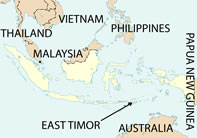This month’s case study takes a brief look at SSR in Indonesia, focusing on changes in SSR advocacy since the 1998 revolution.
-
CSOs, Strategies and Challenges in SSR Advocacy
-
GFN-SSR Document Library
-
Useful weblinks for Indonesia
CSOs, Strategies and Challenges in SSR Advocacy
In Indonesia, reform of the security forces was one component of reformasi, a political reform movement that began in earnest after the 1998 revolution and the subsequent resignation of President Suharto and his authoritarian New Order regime.
Under Suharto, the Indonesian Military had the ‘dual-function’ (dwi fungsi) of maintaining security and actively participating in politics with an allocation of reserved seats in parliament and a capacity to assume governmental functions across the archipelago.
Some normative progress has been made since the end of the Suharto regime in 1998, including the amendment of many legislations, the formation of extra-judicial institutions to strengthen control over the government, as well as more space for public participation in decision making at parliament and government levels. However, the state remains weak in implementing, supervising and evaluating the implementation of those various reform policies.
Whilst civil society actors admit that there has been some progress in reforming security institutions, there is a general acceptance that much work still needs to be done. Indonesian civil society organisations (CSOs) have been making efforts to encourage, influence and supervise SSR processes in the Indonesian National Army (TNI), Indonesian Police (POLRI), State Intelligence Agency (BIN), the Government Presidential Body and Defense Ministry of the Government, and the Indonesian Parliament (DPR-RI)).
Post 1999, Indonesian civil society has been involved in a diverse range of SSR related activity including the development of SSR discourse, policy formulation, military and police curriculum development, advocating for accountability and transparency in security policy and implementation, and holding the state to account over human rights abuses and the misuse of security forces. This involvement has been influenced by several factors including: 1) The accommodation by and compromise to public demands for SSR by political and security elites; 2) The emergence of a generation of politicians who are sympathetic to democratic transition and reform agendas; 3) Increased public access to SSR policy processes (even though this has not been accompanied by any significant public involvement in the formulation process and the substance of reforms generally hasn’t fulfilled public expectations); and 4) Support and pressure from the international community for SSR in Indonesia.
However, at the same time, CSOs have been operating in the face of resistance from security actors and poor support from political elites. President Susilo Bambang Yudhoyono appears to be unenthusiastic in continuing reform processes inside the TNI. Many are of the opinion that he has built TNI, POLRI and BIN’s loyalties to himself rather than creating a democratic control structure. There are also elements within the State that considers Indonesian civil society as a potential threat to the unity of Indonesia; the TNI still perceives that the human rights and law enforcement issues being pursued by human rights CSOs are aimed at debilitating TNI power.
Within the parliament, work on various SSR agendas has stagnated whilst discourse has tended to steer away from substantive SSR issues. Indonesian democracy is still in a process of transformation towards finding a collective meaning among the different competing interests that currently exist. While formal and symbolic reform does happen, it is full of substantial problems which have the potential to become a political boomerang in the future related to compromise decisions on pro-status-quo, anti-reform and even anti-democracy interests.
Ultimately, the tendency to avoid substantive SSR issues in a democratic forum encourages CSOs to advocate an agenda and strategy choice according to the programme capacity and direction of each individual organisation. This results in an uncoordinated drive towards certain policy reviews and cases rather than to consolidate and collectively support fundamental SSR issues. This is detrimental to Indonesia as a whole and can only prolong, if not undermine, an effective and sustainable security sector reform programme.
Mufti Makaarim, Executive Director of The Institute for Defense, Security and Peace Studies (IDSPS), has conducted extensive research on the Effectiveness of Civil Society Organization in SSR Advocacy in Indonesia 1998-2006.
GFN-SSR Document Library
The Document Library contains links to a number of SSR related documents either focussing specifically on Indonesia or looking at the country alongside others as case studies. A selection of these are listed below:
- Almanac on Indonesian Security Sector Reform 2007
- Border Management Reform in Transition Democracies
- Donor Perspective on Security Sector Reform as a Governance Issue
- Off-Budget Military Expenditure and Revenue: Issues and Policy Perspectives for Donors
- Preventing Violent Conflict
- Whose Security Counts: Participatory Research on Armed Violence and Human Insecurity in South-East Asia
Useful weblinks for Indonesia
Below are listed a number of links to websites either containing information about Indonesia or to organisations operating in Indonesia:.
- BBC Country profile: Indonesia
- Indonesian mission to UN
- Lesperssi (Indonesian Institute for Strategic and Defense Studies)
- KontraS
- Institute for Defense, Security and Peace Studies (IDSPS)
- ProPatria Institute
- Pacivis
- Centre for Strategic and International Studies (CSIS)
- Institut Studi Arus Informasi (ISAI)(Institute for the Studies on Free Flow of Information)
- Komnas HAM (National Human Rights Commission of Indonesia)

